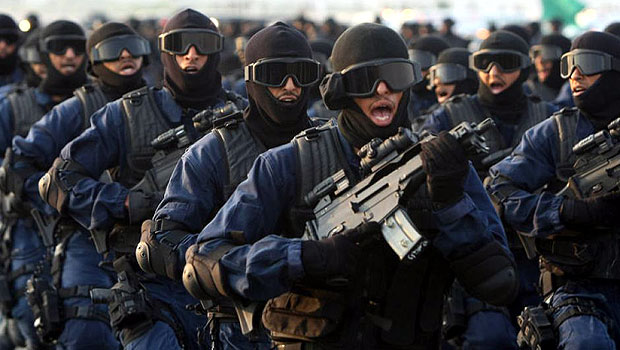
Saudi Arabian special security forces march during a military parade at a base near Mount Arafat, south-east of the holy city of Mecca. (AFP)
News agencies had carried comments from the Iranian foreign ministry earlier this week, denying any link to those accused of spying inside Saudi Arabia, although at the time Riyadh had not named Iran officially.
Turki added, “These elements received financial sums, at regular intervals, in exchange for information and documents about important sites, as part of an espionage operation for the Iranian intelligence apparatus.” He added that investigations with the members of the cell were still ongoing.
In response to a question posed by Asharq Al-Awsat about whether Riyadh will take any political steps as a result, Turki replied, “We in the security services are tasked with, and responsible for, uncovering cases such as these. Because this is an espionage case, we are handling the investigative procedures only.”
“As for political procedures, these will be determined by the Saudi leadership, and we cannot say anything for certain about future political steps.”
Meanwhile, Asharq Al-Awsat has learned that from well-informed sources that the Iranian ambassador to Saudi Arabia has returned to Tehran for unknown reasons, with the Iranian embassy in Riyadh declining to comment.
For his part, Dr. Abdullah Al-Askar, chairman of the foreign affairs committee in the Saudi Shura Council, called for the documenting evidence to be published, telling Asharq Al-Awsat that “it is irrefutable, according to the interior ministry statement.” Dr Al-Askar stressed the need for Iran to know that “our unity is a red line. We respect the Iranian people, who are innocent in this regard, but their government is trying to spread corruption and sedition.”
On the subject of Saudi-Iranian relations, Dr. Asaad Al-Shamlan, director of the European studies center at the Institute of Diplomatic Studies in Riyadh, told Asharq Al-Awsat, “Relations now are in a worse state than they were in the 1990s”.
Dr Shamlan also touched upon the evolving nature of espionage in the 21st century, explaining, “The world of espionage today consists of operations that extend far military follow-up on the ground. For example, cyber warfare is perhaps the main threat and challenge, and what happened with Aramco (with the oil company’s computer systems being struck by a virus in August 2012) raises a lot of question marks about who is behind this work.”
“In general, sabotage has become far more possible through cyber warfare . . . This is not limited to military institutions or other traditional targets.”

Trackbacks/Pingbacks